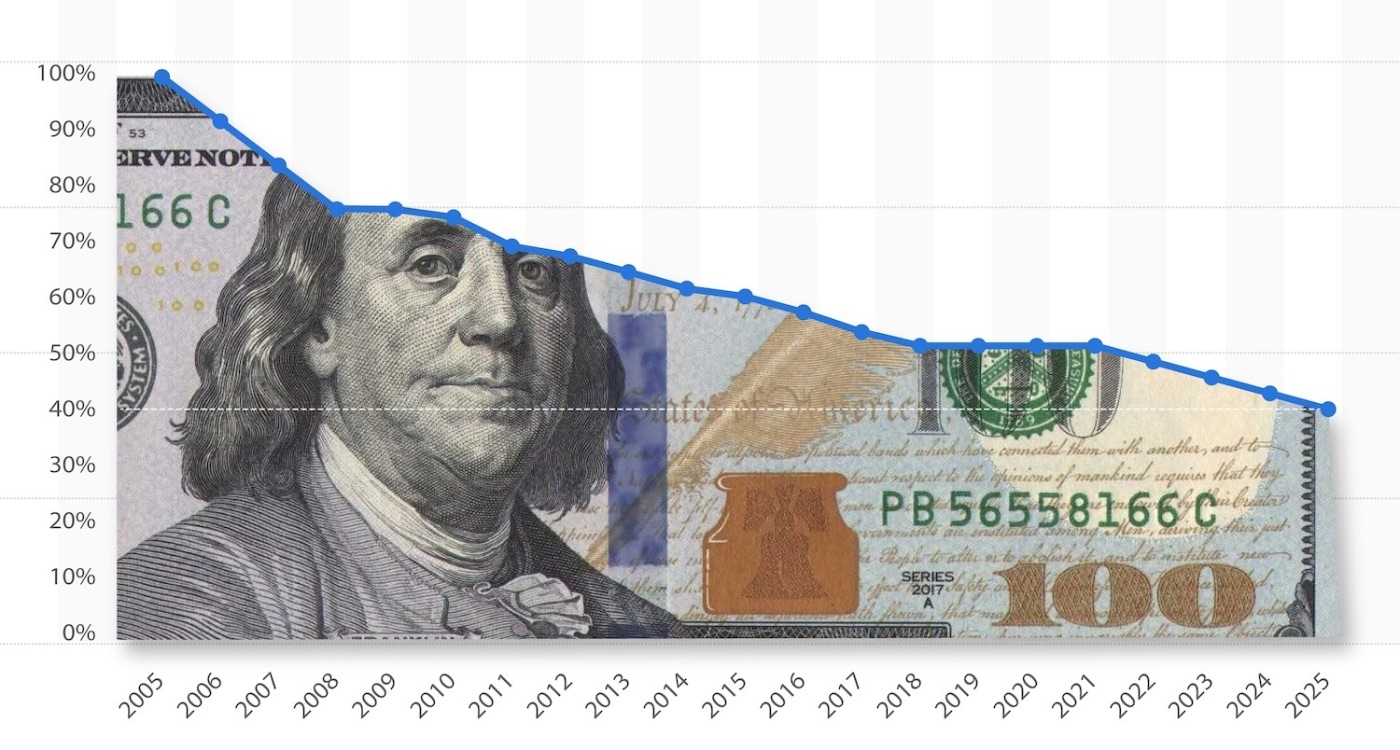Why Wall Street Is Embracing a Digital Gold Rush
In August 2020, Michael Saylor, the CEO of MicroStrategy, made an announcement that sent shockwaves through Wall Street: his company wasbuying $250 million worth of Bitcoin.
This wasn’t a reckless gamble or a speculative bet. He was acquiring Bitcoin as a primary treasury reserve asset—a move that fundamentally changed the way a company could manage its money.
The skeptics were out in full force. They called Saylor irresponsible, a gambler, and couldn’t stop pointing to Bitcoin’s infamous volatility.
But they were wrong.
What truly bothers the cynics isn’t their flawed prediction; it’s what happened next. Michael Saylor didn’t just make a purchase—he opened the floodgates and started a corporate revolution.
Just six months after MicroStrategy’s move, Tesla bought $1.5 billion in Bitcoin. Then came Square, Coinbase, and GameStop. Before long, a quiet trend had turned into a full-blown movement.
Today, this revolution is hard to ignore. According to bitcointreasuries.net, there are now 190 publicly traded companies with Bitcoin on their balance sheets, including big names like Bit Digital, Block, and Trump Media.
This month, these corporate treasuries surpassed a major milestone: they now collectively hold over 1 million BTC, a number that has doubled since late 2024. In total, they command a staggering $115 billion in Bitcoin.
This isn’t just about a few companies dabbling in crypto. It’s about a fundamental shift in how corporations view their reserves, and it’s all thanks to one CEO who dared to think differently.
Bitcoin Treasuries: More Than Just Holding Cash
You’ve heard of companies holding cash, bonds, and other traditional assets on their balance sheets. But what about Bitcoin?
Welcome to the world of the Bitcoin treasury company.
In its purest form, a Bitcoin treasury company is a publicly traded firm designed to give investors a direct stake in the price of Bitcoin. While some companies have simply allocated a small portion of their cash to Bitcoin, a growing number are going all-in, making Bitcoin acquisition the core of their business model.
Take Metaplanet in Japan, for example. This company has become a strategic vehicle for investors looking for simplified Bitcoin exposure, particularly in a region where direct crypto holdings can be heavily taxed.
But the playbook is getting more sophisticated. These firms aren’t just using their existing cash; they’re actively raising capital to buy more Bitcoin. They’re tapping into traditional financial markets by issuing new shares, convertible bonds, and other securities.
It’s a new frontier where traditional finance and digital assets are colliding. And with the financial tools at their disposal, the potential for what these companies can achieve is vast.
Why Wall Street Is Embracing a Digital Gold Rush

Why are some of the biggest companies in the world putting their money into a volatile asset like Bitcoin? The answer is simple: they’re fighting a bigger enemy.
That enemy is inflation.
Inflation is a silent, insidious wealth killer. A hundred dollars today might buy you ninety-five dollars worth of goods next year. Over a decade, a consistent 5% inflation rate could wipe out nearly 40% of your purchasing power. For corporations with billions in cash reserves, this isn’t an inconvenience—it’s a financial catastrophe.
In other words Bitcoin isn’t a speculative play. For these companies, Bitcoin is a defensive asset, a fundamental tool to protect their capital. It’s their hedge against the endless cycle of inflation and monetary expansion.
Traditional “safe” havens have become anything but. A government bond that pays 2% becomes a guaranteed loss when inflation is running at 4%. And high-yield bonds or money market funds? They barely keep up with fees, let alone outpace a soaring cost of living.
For CFOs, boards of directors, and especially shareholders, this level of capital erosion is simply unacceptable. Bitcoin, for all its volatility, is now seen as the only real solution for preserving corporate wealth in an era of unprecedented monetary instability.
Enter Bitcoin.

Bitcoin is far more than a simple cryptocurrency, it’s a revolutionary digital asset. Think of it as digital gold, a superior store of value designed to be a perfect hedge against the very monetary policies that cause inflation.
Michael Saylor describes Bitcoin as “a bank in cyberspace,” a global savings account run by incorruptible software. It’s affordable, simple, and secure for billions of people.
The best part? No central bank can print more of it. No government can devalue it. And no politician can inflate it away.
Is a Bitcoin Balance Sheet Really a Good Idea?
Bitcoin’s stunning rise has captured the imagination of investors and executives alike. But for a publicly traded company, putting a volatile asset like Bitcoin on the balance sheet isn’t as simple as it seems. Before you get too excited about a company’s new crypto holdings, it’s worth asking a few critical questions.
Is Management Losing Focus?
Is this a strategic move, or a distraction? It’s one thing for a company to innovate, but the pursuit of a new, speculative asset class could easily divert management’s attention and resources from its core business. Are the company’s primary operations being neglected while its leaders become de facto Bitcoin speculators?
Is This a Smokescreen?
For some, Bitcoin on the balance sheet could be a convenient way to distract investors from deeper, more fundamental problems within the business. Remember, investors who want crypto exposure have plenty of easy ways to get it on their own—from ETFs and futures contracts to direct purchases. A company’s job is to run a business, not to be an investment vehicle for a separate asset class.
What’s the Price Outlook?
The crypto market is notoriously volatile. For a company, this volatility isn’t just a concern for the long term; it can create major accounting headaches. Under current accounting rules, if Bitcoin’s value goes up, it’s an unrealized gain on the income statement. If it goes down, it’s an unrealized loss. This can lead to wild swings in a company’s reported earnings, making its financial health appear far less stable. And in a worst-case scenario, a sudden and significant price drop could trigger a liquidity crisis.
The decision to hold Bitcoin is a high-stakes bet. The risks aren’t just about a potential loss of value; they can impact a company’s leadership, transparency, and financial stability. As an investor, it’s crucial to look beyond the headlines and ask these tough questions.
The Real Gold Rush Isn’t in the Bitcoin—It’s in the Custody
When a company announces it’s buying Bitcoin, all the attention is on the price and the potential for gains. But there’s a crucial, often overlooked, challenge: security.
Bitcoin isn’t like a stock certificate you can print out and put in a safe. It’s a digital asset and, as we’ve seen from countless headlines, a prime target for hackers. Even the most sophisticated exchanges can be compromised. So, how does a corporation safely store billions of dollars of a highly liquid, digital asset?
This is where the real bonanza of the corporate Bitcoin trend comes in.
The biggest winners of this new “gold rush” aren’t necessarily the companies buying Bitcoin; they are the financial institutions making it all possible.
For a company to confidently hold Bitcoin on its balance sheet, it needs a trusted, institutional-grade partner. This need has created a massive opportunity for a new class of service providers—custodians, brokers, and investment banks that specialize in digital assets.
Companies like Coinbase Prime, Fidelity Digital Assets, and BitGo are leading the way. Unlike the early, often unregulated crypto startups, these are established financial entities that offer a critical service. They provide the secure, audited, and regulated infrastructure necessary for corporations to safely and confidently hold Bitcoin on their balance sheets. In a world where a misplaced private key could mean a loss of billions, these “digital vaults” are the foundation of the entire movement.
n Companies cashing on Bitcoin Treasury trend
| Company | Services | Notable Deals |
|—-|—-|—-|
| BitGo | Custodian | Quantum BioPharma, Bullish |
| Coinbase | Brokerage, Custodian | Thumzup |
| Anchorage | Custodian, Crypto Bank | Trump Media, KindlyMD, Cantor Fitzgerald |
| Cantor Fitzgerald | Investment Bank | Twenty One Capital, MARA Holdings, Bitcoin Standard Treasury Company, Semler Scientific, KULR |
| Galaxy | Asset Management, Investment Bank, Trading Platform | Mill City Ventures, DDC Enterprise Limited, BitMine Immersion Technologies, SharpLink Gaming |
| Cohen & Co | Investment Bank | KindlyMD |
| Morgan Stanley | Investment Bank | Strategy, MARA Holdings |
| Bitwise | Asset Management | OFA Group |
| Two Prime | Institutional Lender | MARA Holdings |
| Barclays | Investment Bank | Strategy |
What Happens Next?
Don’t be fooled—companies aren’t buying Bitcoin because they’ve suddenly fallen in love with it. They’re doing it for one reason: to protect and grow shareholder value.
The corporate Bitcoin revolution isn’t slowing down. It represents a fundamental shift in capital markets and a new form of digital transformation. Instead of having their reserves as “stranded capital” in traditional, inflation-prone institutions, Bitcoin allows for a more efficient and dynamic allocation of value.
This trend is driven by a new financial reality where legacy assets can no longer reliably preserve wealth. The most innovative companies are recognizing that a digital, decentralized asset offers a superior alternative for long-term treasury management.
As this shift continues, we’ll likely see a clear divergence between the companies that embrace this new approach and those that remain tied to a system that silently erodes their value.

Final Thought
The next time you hear someone dismiss Bitcoin as “just speculation,” remember this: over 190 publicly traded companies have collectively committed more than $115 billion to the asset.
This isn’t just a few startups making a risky bet. These are large, regulated corporations.
When it comes to long-term strategy and the preservation of capital, actions always speak louder than opinions. And right now, those actions are speaking volumes, far beyond what even Michael Saylor could have initially dreamed.
n n











